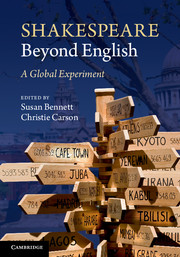Book contents
- Frontmatter
- Contents
- List of Illustrations
- List of colour plates
- Notes on contributors
- Foreword
- Acknowledgements
- Introduction
- The Globe to Globe Festival: An Introduction
- Performance Calendar
- Week One
- Week Two
- Week Three
- Week Four
- Week Five
- Week Six
- Chapter Thirty-Five Habima Merchant of Venice
- Chapter Thirty-Six Patriotism, Presentism and the Spanish Henry VIII
- Chapter Thirty-Seven Touch and Taboo in Roy-e-Sabs’ The Comedy of Errors
- Chapter Thirty-Eight Shakespeare and the Euro-crisis
- Chapter Thirty-Nine Restaging Reception
- Chapter Forty Reviving Hamlet? Nekrošius’ Lithuanian ‘Classic’
- Afterwords
- Index
- Plate section
- References
Chapter Thirty-Seven - Touch and Taboo in Roy-e-Sabs’ The Comedy of Errors
Published online by Cambridge University Press: 05 June 2014
- Frontmatter
- Contents
- List of Illustrations
- List of colour plates
- Notes on contributors
- Foreword
- Acknowledgements
- Introduction
- The Globe to Globe Festival: An Introduction
- Performance Calendar
- Week One
- Week Two
- Week Three
- Week Four
- Week Five
- Week Six
- Chapter Thirty-Five Habima Merchant of Venice
- Chapter Thirty-Six Patriotism, Presentism and the Spanish Henry VIII
- Chapter Thirty-Seven Touch and Taboo in Roy-e-Sabs’ The Comedy of Errors
- Chapter Thirty-Eight Shakespeare and the Euro-crisis
- Chapter Thirty-Nine Restaging Reception
- Chapter Forty Reviving Hamlet? Nekrošius’ Lithuanian ‘Classic’
- Afterwords
- Index
- Plate section
- References
Summary
The climax to Afghan company Roy-e-Sabs’ The Comedy of Errors gained much of its power through its physical manifestation of reunion. When Parwin Mushtahel's Zan-e Motakef (Emilia) recognized Shah Mamnoon Maqsudi's Ehsan (Egeon) as her husband, their subsequent embrace drew a spontaneous and highly emotional round of applause from the audience at Shakespeare's Globe. It was the first in a series of reunions between estranged family members – brothers, lovers, parents and children – each of which moved the audience to further applause and cheering. Here, the final hand-hold between the two Dromios (here named Bostan) was just one more in a sequence of physical embraces which had involved hugs, clasps, kisses and the cupping of faces. Roy-e-Sabs’ Paris-based director, Corinne Jaber, has argued that such reunions carry a particular emotional charge for Afghan audiences, many of whom will themselves have travelled to search for lost relatives after long periods of enforced separation.
The Globe audience presumably included a significant number of Afghan expatriates, since many were clearly following the Dari Persian language. This was an audience willing to express its emotional responses loudly and emphatically: from ironic wolf-whistles at Shah Mamnoon Maqsudi's drag-act Kukeb (Nell), to laughs of delight at the production's inventiveness and gasps at its plot twists. Some of the more excitable reactions came in response to the production's willingness to break Afghan cultural norms: while touching between genders is highly taboo in Afghanistan, the women in The Comedy of Errors touched the male performers frequently, and often in overtly sexual ways. Sodaba/Adriana rubbed her leg against that of Arsalan of Samarqand/Antipholus of Syracuse; Rodaba/Luciana wrestled on the floor with Arsalan of Kabul/Antipholus of Ephesus; all three women embraced their husbands in the final scene.
- Type
- Chapter
- Information
- Shakespeare beyond EnglishA Global Experiment, pp. 282 - 286Publisher: Cambridge University PressPrint publication year: 2013

